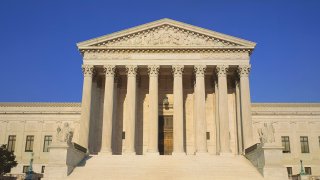
The Supreme Court on Thursday rejected a business-backed challenge that could have scuttled the federal agency set up to protect consumers from shady financial services practices.
The court on a 7-2 vote ruled that the funding structure of the Consumer Financial Protection Bureau, which allows the agency to be funded directly by the Federal Reserve, is constitutionally sound.
In doing so, the court rejected claims brought by two trade groups representing lenders, which argued that the agency had to be funded by annual appropriations approved by Congress.
Conservative Justice Clarence Thomas authored the majority opinion, while fellow conservatives Justice Samuel Alito and Justice Neil Gorsuch dissented.
Get top local stories in Connecticut delivered to you every morning. >Sign up for NBC Connecticut's News Headlines newsletter.
The court ruled that the funding structure, in which Congress does not directly appropriate funding, does not run afoul of the Constitution’s Appropriations Clause, which requires that “no money shall be drawn from the Treasury” without congressional approval.
"Although there may be other constitutional checks on Congress' authority to create and fund an administrative agency, specifying the source and purpose is all the control the Appropriations Clause requires," Thomas wrote.
The case is one of several on the docket in which the Supreme Court, often skeptical of broad federal agency power, could hobble government regulators.
U.S. & World
In 2018, the Community Financial Services Association of America and the Consumer Service Alliance of Texas sued the CFPB in an effort to throw out a regulation cracking down on payday loans.
A federal judge ruled in favor of the bureau after it modified a regulation barring lenders from repeatedly seeking to withdraw loan repayments from consumers’ bank accounts if there are insufficient funds. The new rule has yet to take effect.
But the legal question before the Supreme Court rested on a subsequent decision by the New Orleans-based 5th U.S. Circuit Court of Appeals, which ruled in October 2022 that the bureau’s funding mechanism was unlawful.
Congress itself set up the CFPB and approved the current funding structure when it passed the Dodd-Frank Wall Street Reform and Consumer Protection Act in 2010.
The law states that the CFPB receives funding determined by its director to be “reasonably necessary to carry out the authorities of the bureau” as long as it is under the cap of 12% of the operating expenses of the Federal Reserve. In the 2022 fiscal year, the agency received $641 million.
The Biden administration argued that Congress “enacted a statute specifically organizing the CFPB to use a specified amount of funds from a specified source for a specified purpose,” which was sufficient pass constitutional muster.
The CFPB has faced various legal challenges in the past, with the Supreme Court ruling in 2020 that a separate provision that protected its single director from removal by the president at any time during the five-year term of office was unconstitutional.
This story first appeared on NBCNews.com. More from NBCNews:



